“Cascade”
2. a process whereby something, typically information or knowledge, is successively passed on.
"the greater the number of people who are well briefed, the wider the cascade effect"
At its core, Cascade is reference material for BIPOC in creative spaces. It focuses on bolstering the amount of representation of BIPOC in the arts through photographs and interviews. Articles with interviews give artists across various mediums the space to speak candidly about their experiences in their relative fields- while the editorials work towards filling the gap of representation in the realm of creative practices.
Cascade was made possible with the support of the Toronto Arts Council.
Cascade is best viewed on desktop.
The final edition of Cascade.

I’ll keep this short and try to close off Cascade as a photographer and not a journalist lol. With that being said, words alone aren’t enough to describe what Gyimah does. His work is an amalgamation of the endless layers of Black identity in which he bends and explores whatever stylistic approach he deems fit at the time. From images surrounding exploration of self, sexuality, religion, sports, Black joy, Black pain to an entire kids show with characters inspired by his siblings- there’s no way to guess what he’ll do next.
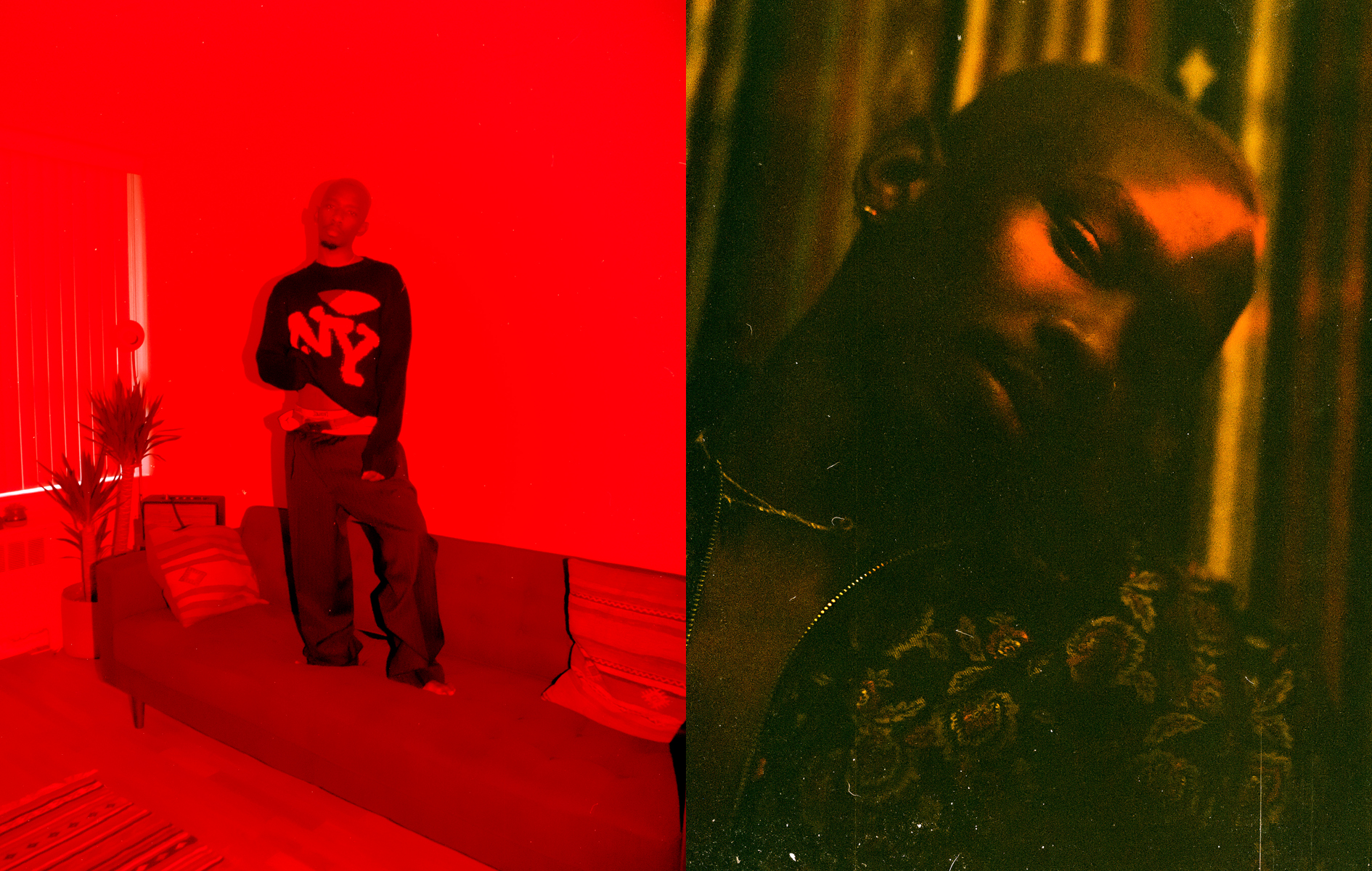
I first came across Gyimah’s work through a tumblr repost by Virgil of a Pyrex illustration he did at the time, near the end of tumblr’s life span- which is now maybe 7 years ago? I’m not sure. We connected through whatever social media people used back then, I proposed a project where we collaborated with photo and illustration (lol I had no idea what I was trying to accomplish but I wanted to work together). I took some really bad photos of him, he did an amazing illustration of me and we went back and forth with some ideas that never really came to fruition.
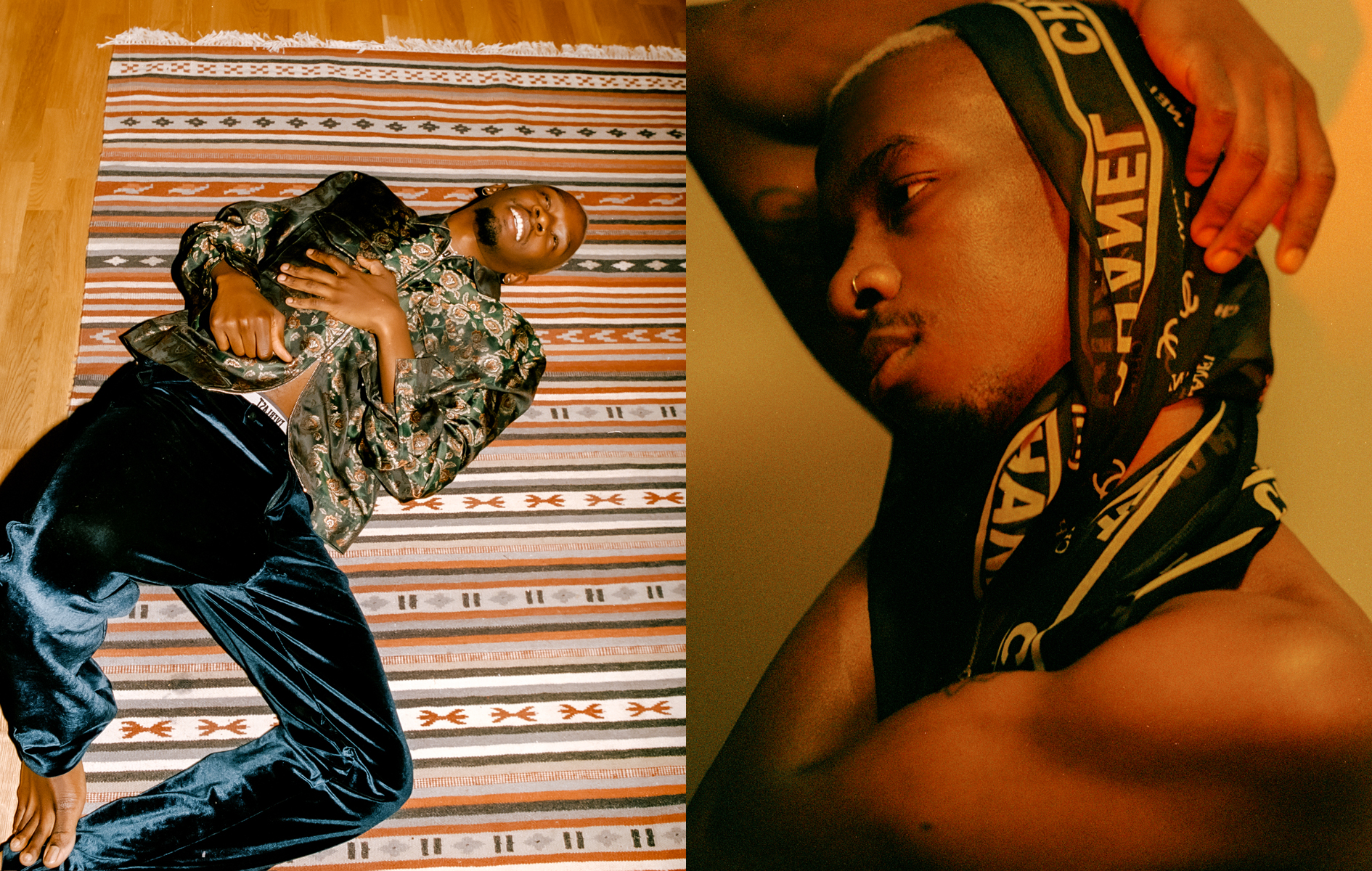
The predominantly white art world has never been a kind place or an easy place to navigate, so it’s always a blessing to find Black artists that have broken barriers to any extent. Even after world shifts and uprisings, there’s still a glaring lack of representation. Which is why (beyond being a friend of mine) I wanted to include Gyimah in this project.

I implore you to do a deep dive of Gyimah’s work and try to find a copy of Navel Gazing if you don’t own one already.

I took these photos of Akua in her apartment in LA, maybe 3 years after we became friends and 20 minutes after she ~revealed~ that it was her singing on Hush Money and Fake Loathe by Blue Iverson. I was definitely embarrassed that I didn’t recognize her voice but simultaneously felt this odd sense of joy thinking like, damn yeah, I finally know whose voice that is (and it happens to be one of my friends). 75% of the people I know have had Hush Money on loop at some point in their lives and I definitely made it my job over the course of the next few months to let every one know it was her 😂️.

Besides all that, I wanted Akua to be a part of Cascade because she’s someone who has accomplished so much through music (an amazing album ‘Them Spirits’, tour with Solange, tour with Kindness, supporting Dev Hynes at multiple shows, supporting Robyn, performing live at The Getty and more) and is so modest. She’s never been the kind of person to act as though these profound moments in her life have made her any better or more valuable than anyone else, which is something I think we all can learn from. We shot once previously in LA and I botched that shoot, the photos were not good, not good at all lol, so I had to make sure we reunited and got it done properly.


I once again have no idea how Akua and I met but in our short time being friends we’ve shared so many memories and I’m forever grateful for the guidance I’ve received from Akua at some of the lowest points of my life and honoured to have her as a friend.
Justen LeRoy : Director, Musician, Artist, Curator

My relationship with Justen began the way many of mine have over the years, a follow on instagram > exchanges of shared interests > meeting in person > realizing this person is truly a great human > friendship continues when we’re in the same city. I don’t remember exactly when this happened but I remember why - one of his posts at the time was a video of black water tinted blue with a bass voice harmonizing over a soul filled score that blew my mind. At the time I didn’t know it was him but I assumed as much and being who I was I had to tell him how good it was. Since then, we’ve shared wisdom, joy, pain, birthdays, celebrated one another in times of success and have been voices of support when our conviction waned.
Over the course of my life I’ve always felt alien. A lot of this probably has to do with insecurity but as I’ve gotten older I’ve also realized that I was constantly yearning to be understood as the truest version of myself in a way that I wasn’t being given. I was often the other, dating as far back as high school being the only person wearing slim jeans (511’s and Jordan 6’s my goodness) and being laughed at by my peers. For better or worse this has led to a limited ‘core’ group of friends, the (offensive) term ‘tribe’ was one I used often when describing my ambition, before recognizing how it’s usage diminishes/erases the significance of Indigenous Tribal identity. With a lack of long term friends, in my adulthood when I’ve found people who I feel close to I’ve tried my best to hold on to them, cherish them and celebrate them. Justen has become one of those people in my life.
Two shoots over the course of three trips to LA spanning across 4 years and I’m happy to finally share Justen’s interview for Cascade.

Michael Nyarkoh : What was the first thing in visual culture that you discovered independently of externally that lit the fire of imagination? Does that piece of work connect with you still?
Justen Leroy : The first thing in visual culture that impacted me would definitely have to be album packaging from back in the day. I think I saw it as a portal into learning more about the artists story or whatever they were trying to communicate but it also kind of led me to so much of the information behind the songs, you know? It rounded out my [perspective] of what a full idea should have- I love things that are full of detail, I love things that help explain a narrative, yeah and I feel that all still connects with me and I find it in so many different spaces and in so many different ways.
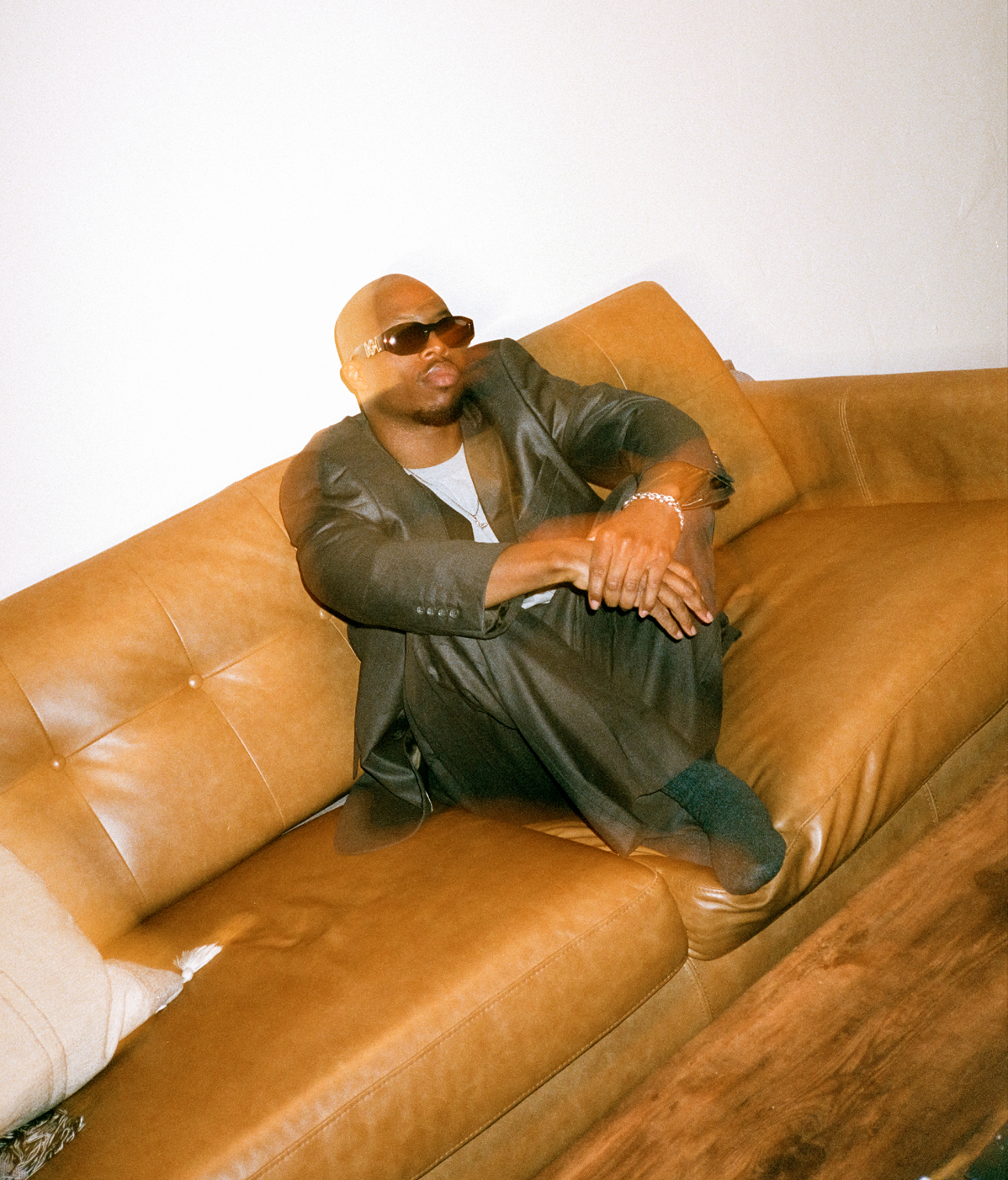
MN : Your work with SON Studio is centred on Black male identity and creating space for a nuanced understanding of masculinity. How has your idea and approach to that conversation evolved?
JL : I’ve taken a really big step back from SON- I think that for a really long time I was seeking out family and SON really brought me that. It did bring me face to face with so many people of the Black male experience in all ways and it did open a world of conversation that I was seeking, however I feel like now I’ve learned a lot about what It means to fuel myself.. I saw SON as a project that was fuelling me but the entire work behind is what service, the movement was service and I’m learning how to bring service through me in another way that might not feel as spiritual exhausting and also realized that there are people that are qualified to do that kind of work that I was trying to do, you know, people who have studied that shit for years- therapy sessions and all types of wellness, it’s a really large practice and I was just you know, a young nigga really trying to create the world that I wanted to live in and maybe bit off a bit more than I could chew, so I’m kind of reeling it in and finding new ways of service that don’t require me to be on the front line. But I think that my approach when it comes to working on the friendships and fellowships I have with other Black men are definitely informed by kind of being in that work for that said amount of time and I was able to teach myself really valuable lessons and be exposed to really valuable experiences. I still wish for all the same things, I want there to be a space where we can be our full selves, where we are sharpening the ways we communicate with one another and ourselves, where we are in charge of our beings and our bodies and we feel fulfilled and that we have outlets to kind of discuss these things whether it be through art or whatever medium you choose. I definitely want that for the world still but do I need to be the face of it? I dont know.. I don’t know.
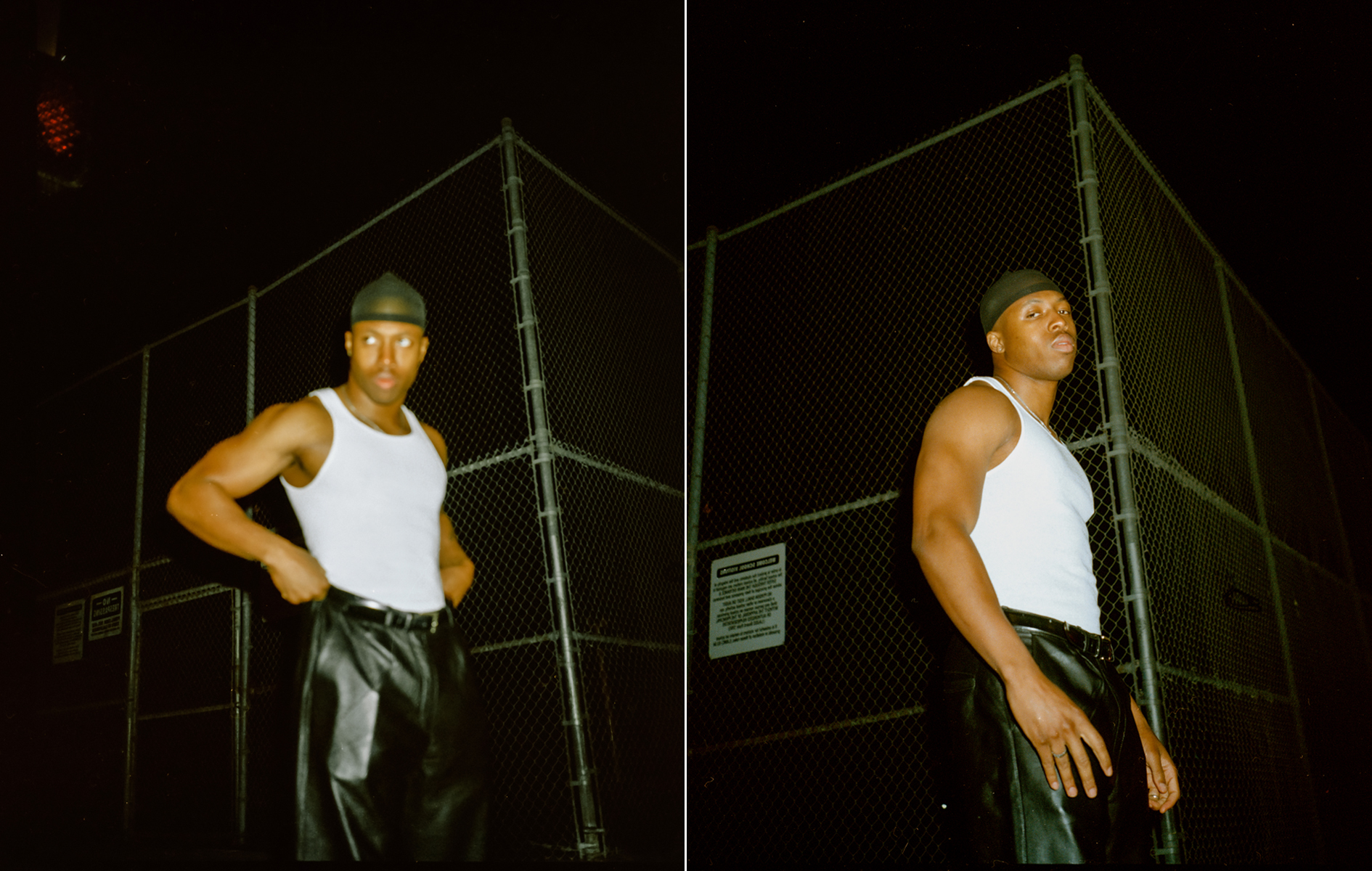
Othello Grey : You’re most expansive body of work ‘Lay Me Down in Praise’ was on view at the California African American Museum- can you tell us how a project like that comes into existence and what kind of steps are involved in linking so many artistic elements together when putting together a project of that magnitude (Sound, film as well as the theory in itself)?
JL : This might be a really long answer so hang in there with me. Lay Me Down in Praise is definitely the most extensive thing I’ve ever done in my life. I’m very proud of it. I think it was an opportunity for me to no longer hide. I think I’ve been hiding behind so many of the other opportunities and amazing projects that I’ve had the chance to be a part of and I think creating Lay Me Down in Praise was my first real chance to, take a chance on myself and bet on myself and really get out there and get all the things that are in my mind that I’ve been deep in the study of but maybe haven’t been very loud about. I dont think many people saw it coming, I definitely had many moments of doubt in the process but its been living in me for maybe the last 10 years and I think along the way throughout my journey I’ve picked up so many other skills and ways of understanding visual culture and sonics and I’ve had the opportunity to live in museum spaces but to also live in music spaces but all of that is really important to me and foundational for me. So it just kind of came a time where, it felt like time to use all of the things that I had amassed, all the information and skill that I had amassed.
When it comes to bringing something like that together I really felt led by spirit, I felt led by my faith, I was working on another project and through my research of that I was in a lot of Fred Moten writings and kind of picking up random shit, like random books on ecology and I began to find a common thread between was I reading from Fred Moten in regards to his language around the wordless groan within the gospels tradition and within the Black experience and I was reading about trees about how trees moan at the hands of whiteness and it was talking about this larger environmental disaster that had me really thinking about race and the environment and how Black people are so uniquely affected by it all but I dont know if we often feel like within our communities we have the space to really talk about that shit as we’re thinking about every day survival, so the future of the earth is kind of in the back of our minds, like we not really thinking about that shit. So I found myself wanting to create something that felt like a world that allowed us .. well not allowed us because its definitely happening but another way for us to maybe engage these ideas, engage our bodies within the reality of us being on the earth, so it is a three channel visual sonic experience that is kind of creating a route to Black environmentalism and me really pairing together the anxieties of the earth with the anxieties that we feel as a people and the beauty to and the terrain and finding so many parallels between the two with hopes that we’d begin to see ourselves as one with the earth and we can begin talking about that and we can kind of build on that language.
I basically had the idea but I’d never made a film before, I’d never made a score before, I had never done any of this shit before and somehow I got (haha), the Californian African Museum to get on my side and support me with seeing this thing exist and it’s really kind of crazy because thats an opportunity that I think that people are much further along in their careers get and I think there was just something about, I don’t know, my tenacity, my understanding of how museums work, my desire to navigate to get to where I want to be, I don’t know, something about that shit kind of let me to be in this situation where I had the space to create something and be supported in the way that I originally envisioned. So that was all coming together, we shot everything during the summer, in July and there were so many moving parts, things I’m still trying to understand and like haha, putting on a production - if you’ve never done that before is insane but to be the person that everyone looks to is wild and also I put myself in that crazy ass situation which is fuckin’ crazy, like what the fuck, so I was stressed the fuck out but I was excited at the same time and I couldn’t believe any of that was actually happening and that I had a set full of people actually doing shit and like putting up lights and shit like that, thats fuckin’ crazy.
Yeah around that same time the score had already been in the mix, I’d been working with Hadyn who scored this with me, we’ve been working together for the last maybe like 9 years so we do have a rhythm that feels super smooth and once we had the footage we were able to really finalize all of the sonics and yeah, I worked with some friends that I really love and people that I really look up to. I recored Moses Sumney for it, Diana Gordon and then from London my homegirl Nadia, she sent over some vocals and shes one of my favourite singers in the world man, such a beautiful full heavy tone you know. Yeah, then what happened.. hm, ok wait I feel like there’s another part of this that I should be saying um, okay alright fuck it.
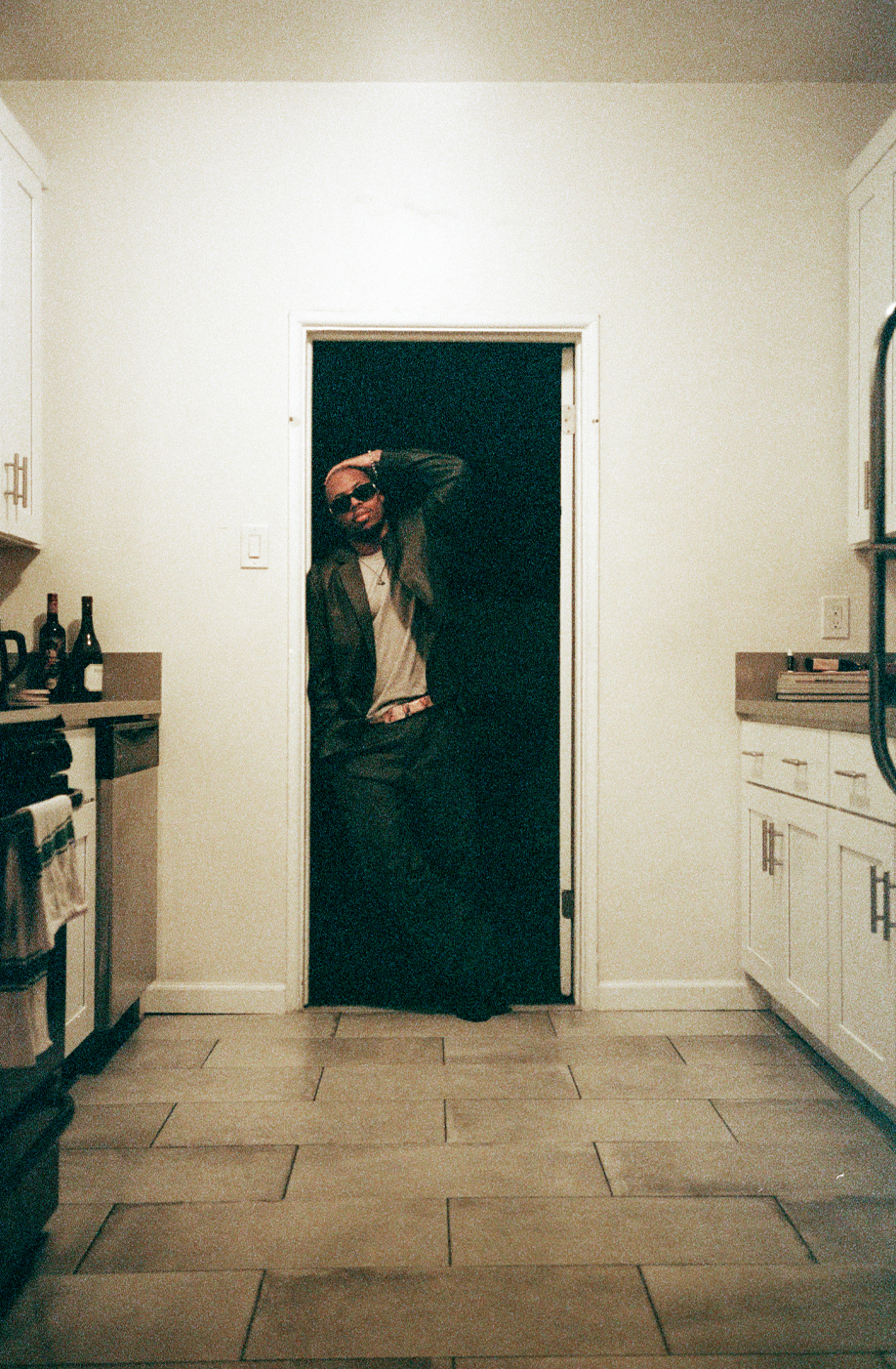
OG : I always think about how creating work as a Black artist can be ignored by the art world if it’s not revolving specifically around Black identity, Black struggle / plight- how do you navigate this as an artist? For instance, if a Black artist paints a landscape of dots, it wont be heralded versus white artists who have the space to explore all ranges of their imagination without the fear of being criticized so heavily.
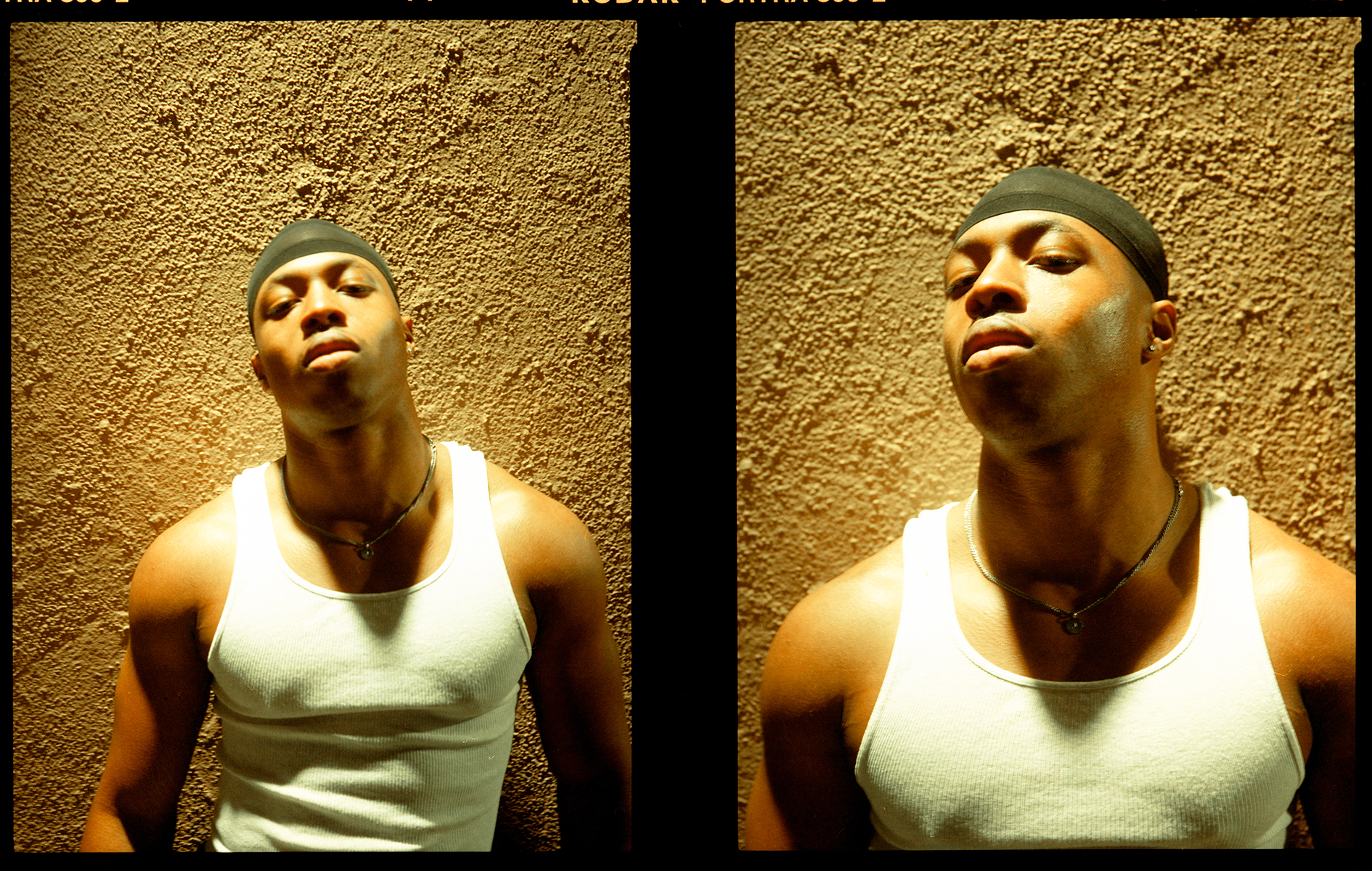
JL : I think thats some bullshit, I think its insane, I think in order for us to be celebrated it definitely has to be like.. 12 years a slave where you have to be lynched or .. it’s insane, it is crazy. It’s so damaging because our experience is constantly evolving like why won’t anybody making a movie about how little girls are changing the world through dances on tiktok? Thats a movie I want to fuckin’ watch, I don’t want to watch somebody else getting beat on the field.. it’s silly. We don’t have the space to just be people, I don’t think its exciting still to see us just be healthy and for us to be imaginative and for us to be world builders in a way that doesn’t have anything to do with us running away from a struggle or something. Thats what that all exposes still, we still don’t get an opportunity to just be humans, who just want to draw dots- the way I navigate that? I’m not sure if I’m being honest with you, I’m just going to do what I want to do regardless. Right now I have my own things that I’m trying to work through that do have to do with my identity as a Black person and just certain questions I don’t see being asked but I think that what might be unique about that is that I’m not speaking to white people when I make said work. The reason why Lay Me Down In Praise is where it is, is because it’s like down the street from my childhood home and it’s up the street from high school and my tenth grade high school teacher came to the opening and shit, for me it just feels really foundational to have my work centred there because thats who I’m talking to and thats who I wish to grow language with and yeah, I guess I just don’t think about white people at all. Never, haha. I really only care what we have to say honestly, I want the validation from niggas and yeah, if I dont have that then I dont think I’m doing shit and that has nothing to really do with any of the other systems or with what white people get to do or anything, if I just get to show work to Black people and get to spark ideas and spark confidence and faith and some sort of spirituality or change in alchemy within something or somebody then I think I’ve done my job. Yeah, hopefully that makes sense.
“Right now I have my own things that I’m trying to work through that do have to do with my identity as a Black person and just certain questions I don’t see being asked but I think that what might be unique about that is that I’m not speaking to white people when I make said work.”
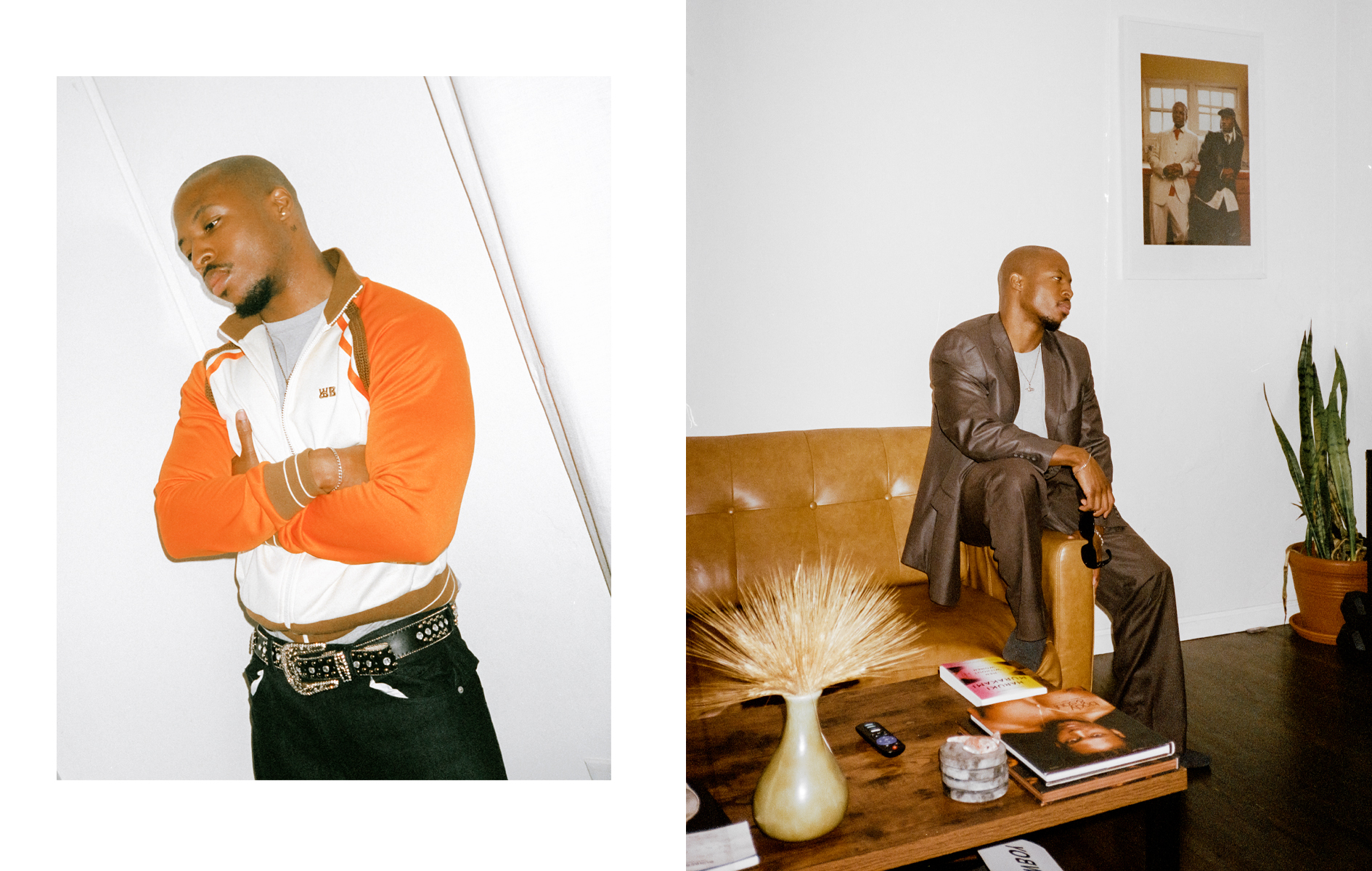
MN : Does being a Black artist in 2023 feel different than it did before? Pre Covid/social unrest?
JL : What I will say, is that I feel like there is definitely way more support now to be a Black person making work then before Covid and I don’t know if that’s some guilt shit .. I mean duh right but I think us being uniquely affected by covid number 1 and then George Floyd passing during Covid it just kind of sparked a whole new pathway I think for us and opened up so many other portals of possibility. In a way its like what the fuck? But then it’s also like hand it over bro, yeah. I think there’s definitely more opportunity, I don’t know how long thats going to last and I’m so happy that so many people have hopped in there and done what they’ve needed to do and they’ve cultivated their ideas and have become millionaires within that time frame, not that capitalism and shit like that should be at the forefront but I think everybody is trying to survive and if you can survive through the thing that brings you the most joy, if you can survive through your gift and navigate the world through your gift then yes, wow thats kind of the life we all wish for. I’m so happy that in that pocket of time so many of us were able to get a slice of that but then I’m also young, I dont know what it was like to be a Black artist in the 90’s or what opportunities were there or weren’t there, I don’t know what it was like in so many ways but from my little time with it all I’ve definitely seen a change and I’ve definitely seen so many folks make good with what we had.
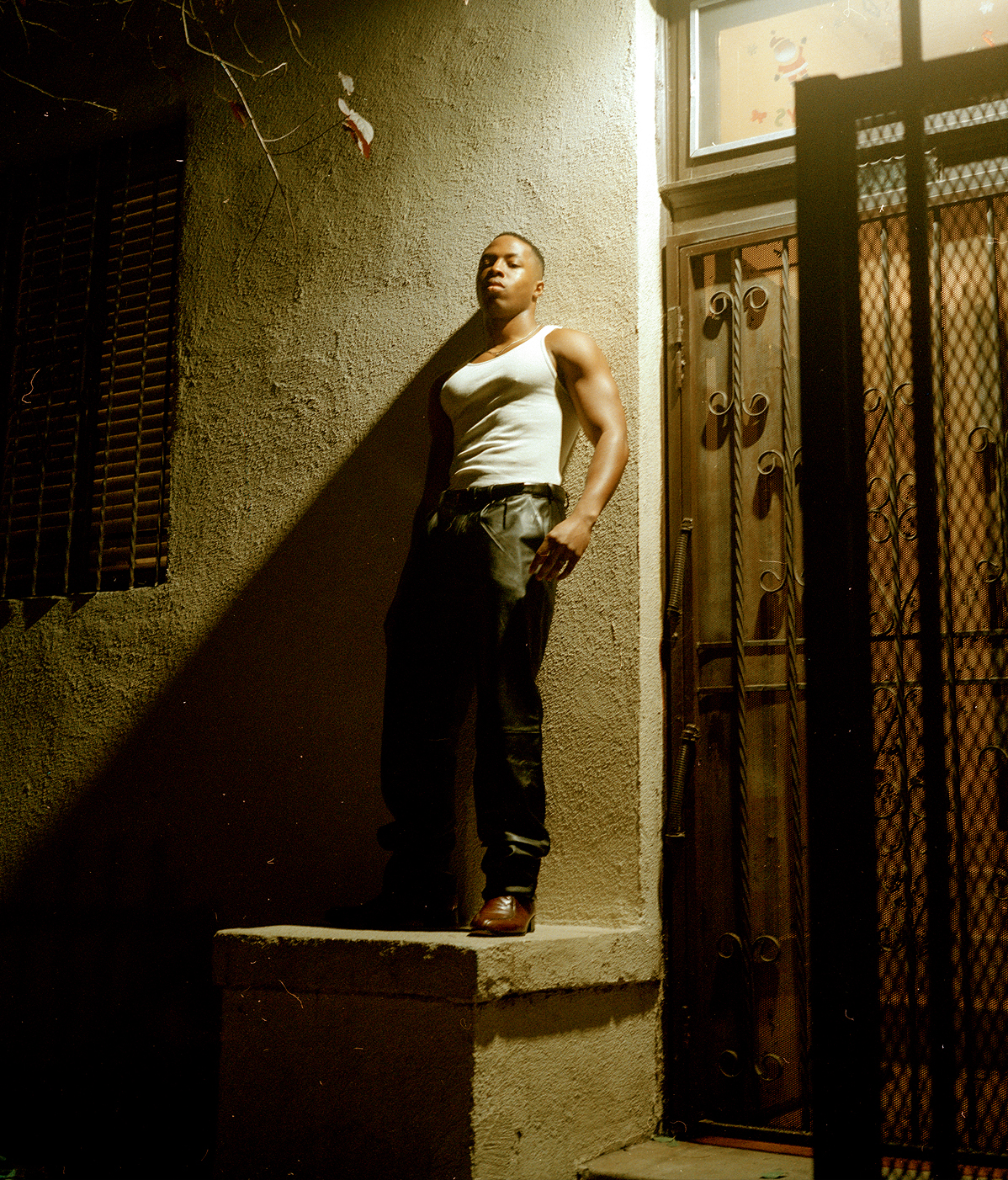
OG : What would you tell the 18 version of yourself if you were to have a conversation today? What guidance or advice would you lend to him in preparation for the years ahead?
JL : Man the 18 year old version of me would be so fuckin’ hype, are you kidding me? I gotta think about that shit all the time, I’m like 18 year old Justen would be fuckin’ flipping like, he ugh, he would not believe it, he wouldn’t believe it, like what the fuck? Haha. I would tell him to be patient- although you don’t know patience when you’re 18 because every day feels like do or die or shit is real now so I really need to start settling down and figuring out my shit but.. be patient, continue to walk in your path cause your unique voice, the space that you carve out in the world might not be poppin’ now but everybody is going to want in and people will respect you deeply, because you are exactly who you are. And yeah, keep on having a good time, go out more, I know you hate everything and you hate everybody bro but like try, just try a little bit more, just try.. and you’re going to be okay. You know, you have definitely come from insane hardship and you are doing everything in your power to make sure you don’t go back and let me tell you something big man, you will never go back and everything will be just fine. Just continue to put your foot down and advocate for yourself, do not minimize yourself, do not minimize how you feel about things to make anybody else feel better about whatever they feeling because its typically some bullshit. Trust yourself, love yourself, keep on singing, keep on dancing, keep on living my nigga.
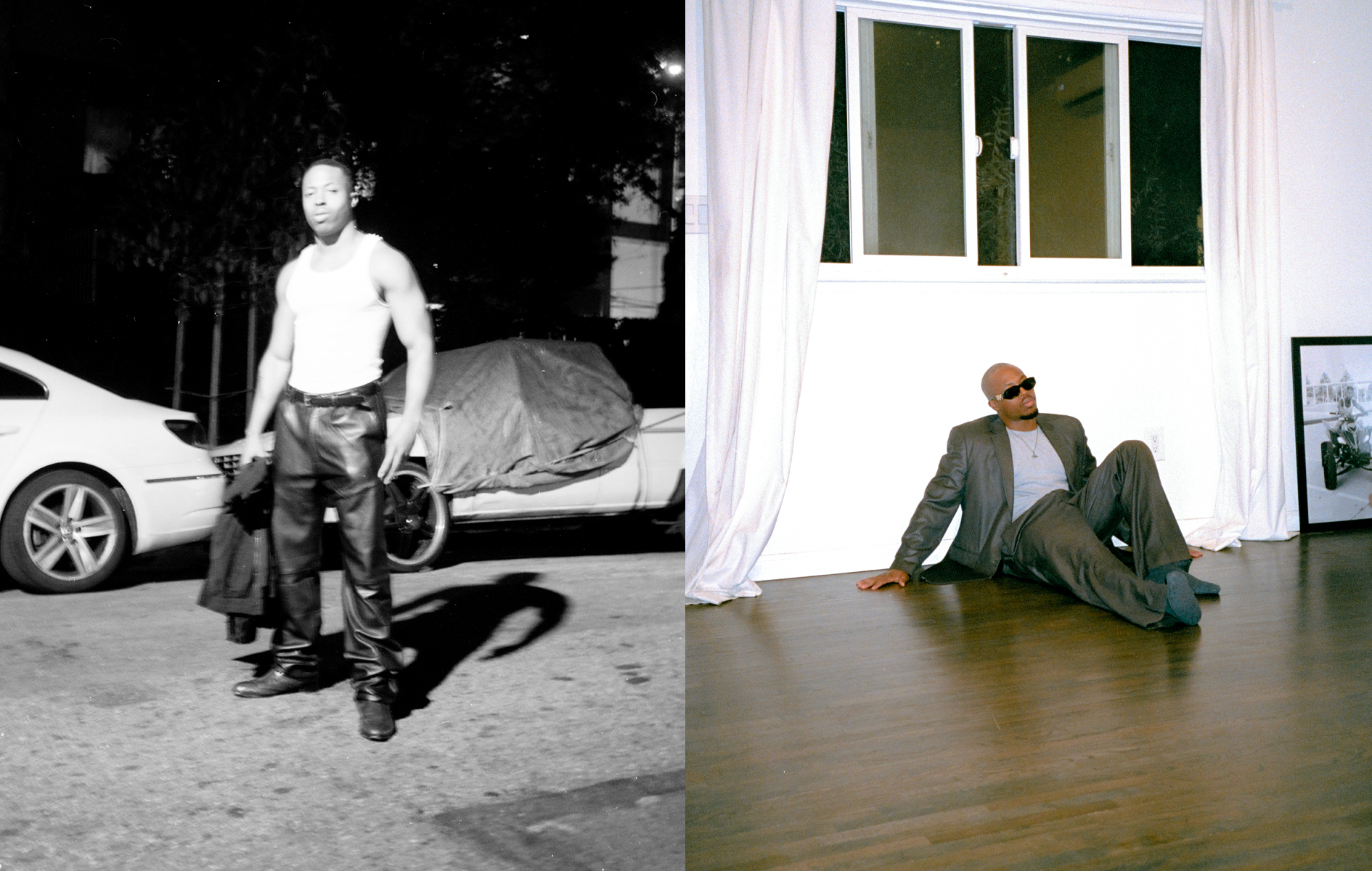
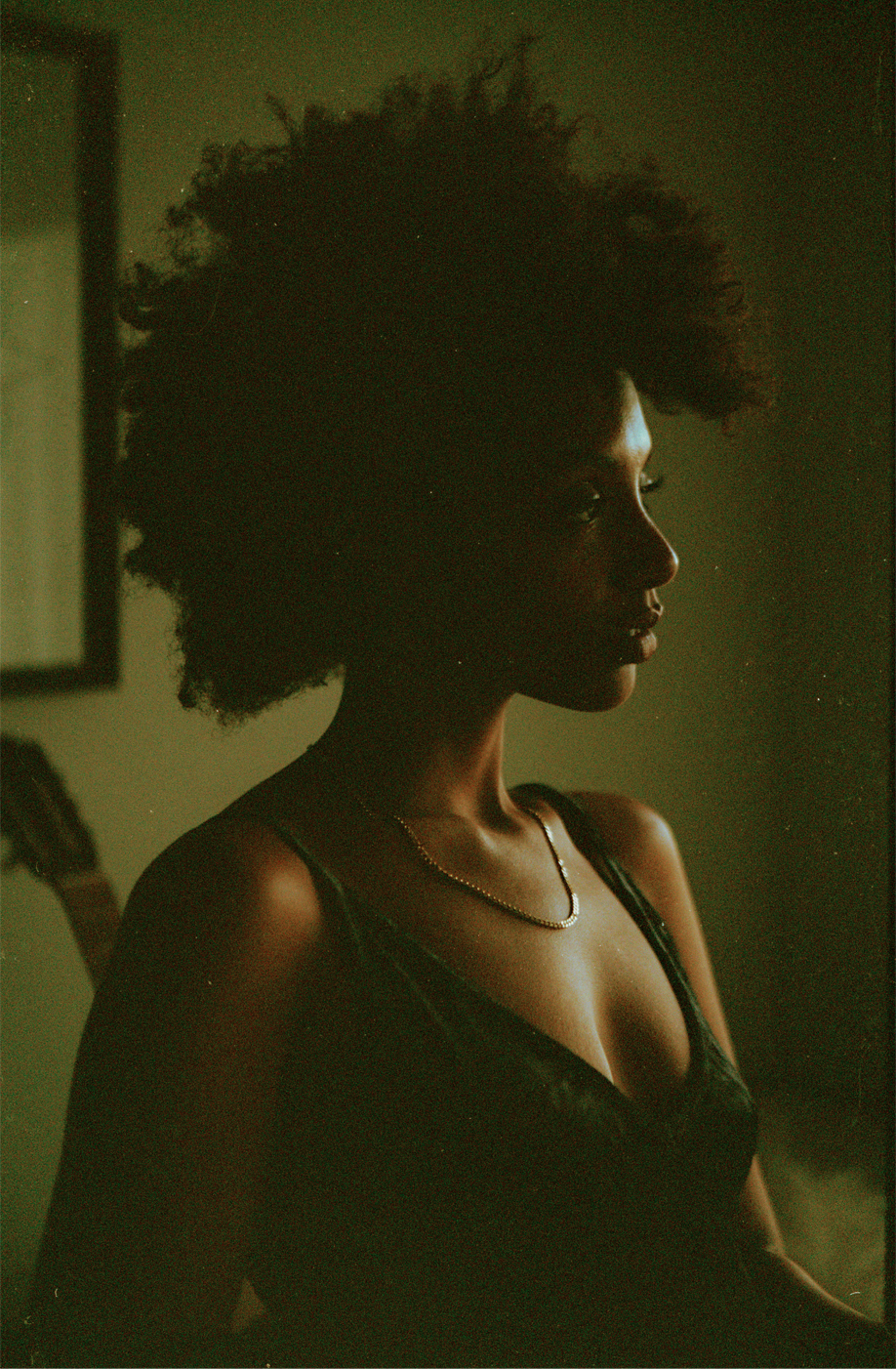
I first encountered Mereba’s music through her music video ‘Bet’ during a ritualistic dive through Nowness, which was like the local news for me in 2017. A thumbnail of a group of Black men playing soccer in plain clothes caught my attention as I scrolled and I decided to see what It was all about. Truthfully I probably would’ve watched it eventually as I probably watched or at least skimmed through 90% of the videos available each week. I had no idea what I was in for.
Purple and white oxfords dance across the screen, Black hands cheers dark liquor, a bird glides overhead, Black hands grasp a fruit, a palm tree blows in the wind, a silhouette exhales smoke between red lights, a shadow stumbles out of frame and then fireworks signal the strum of a guitar- I was enchanted in 20 seconds.
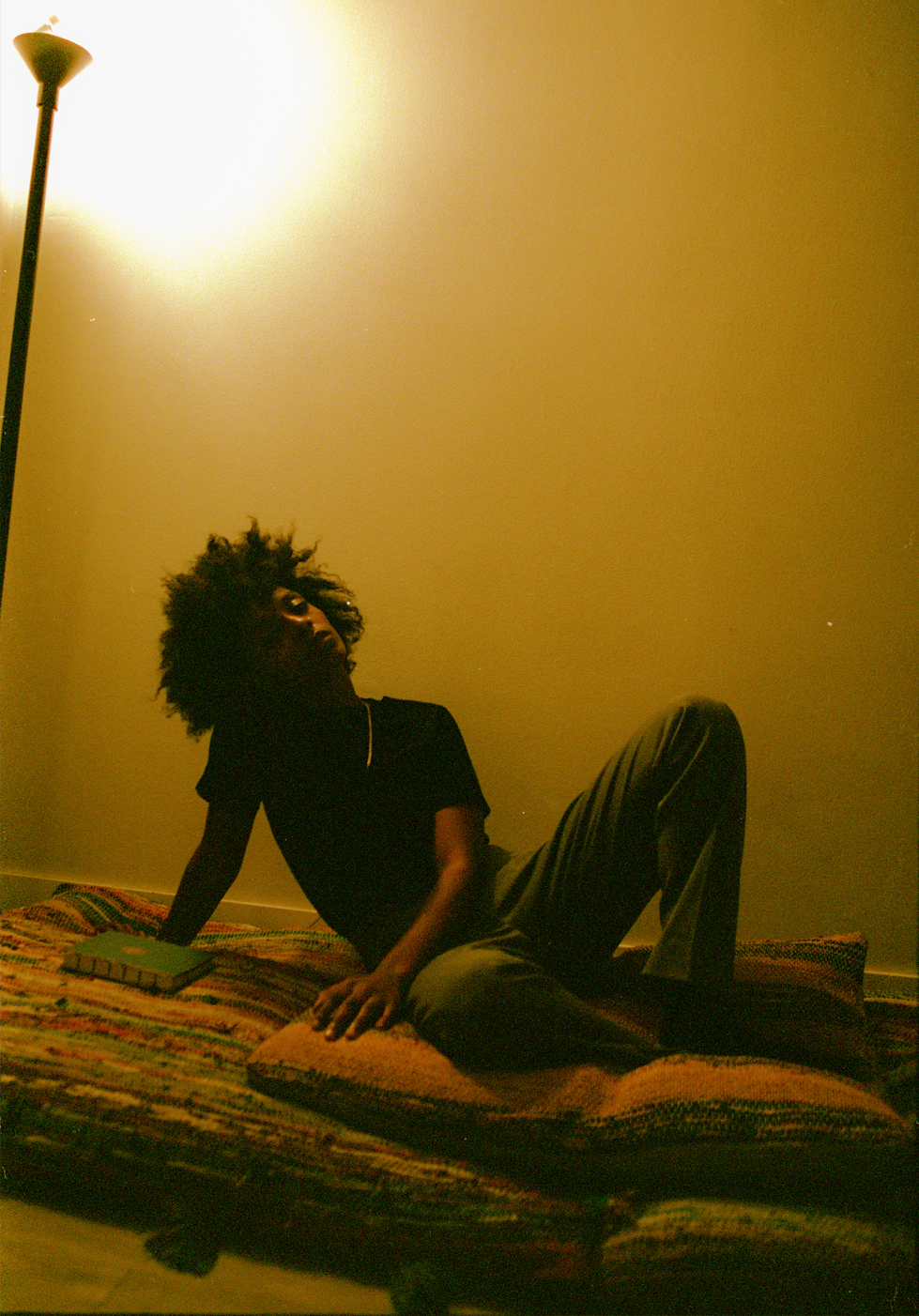

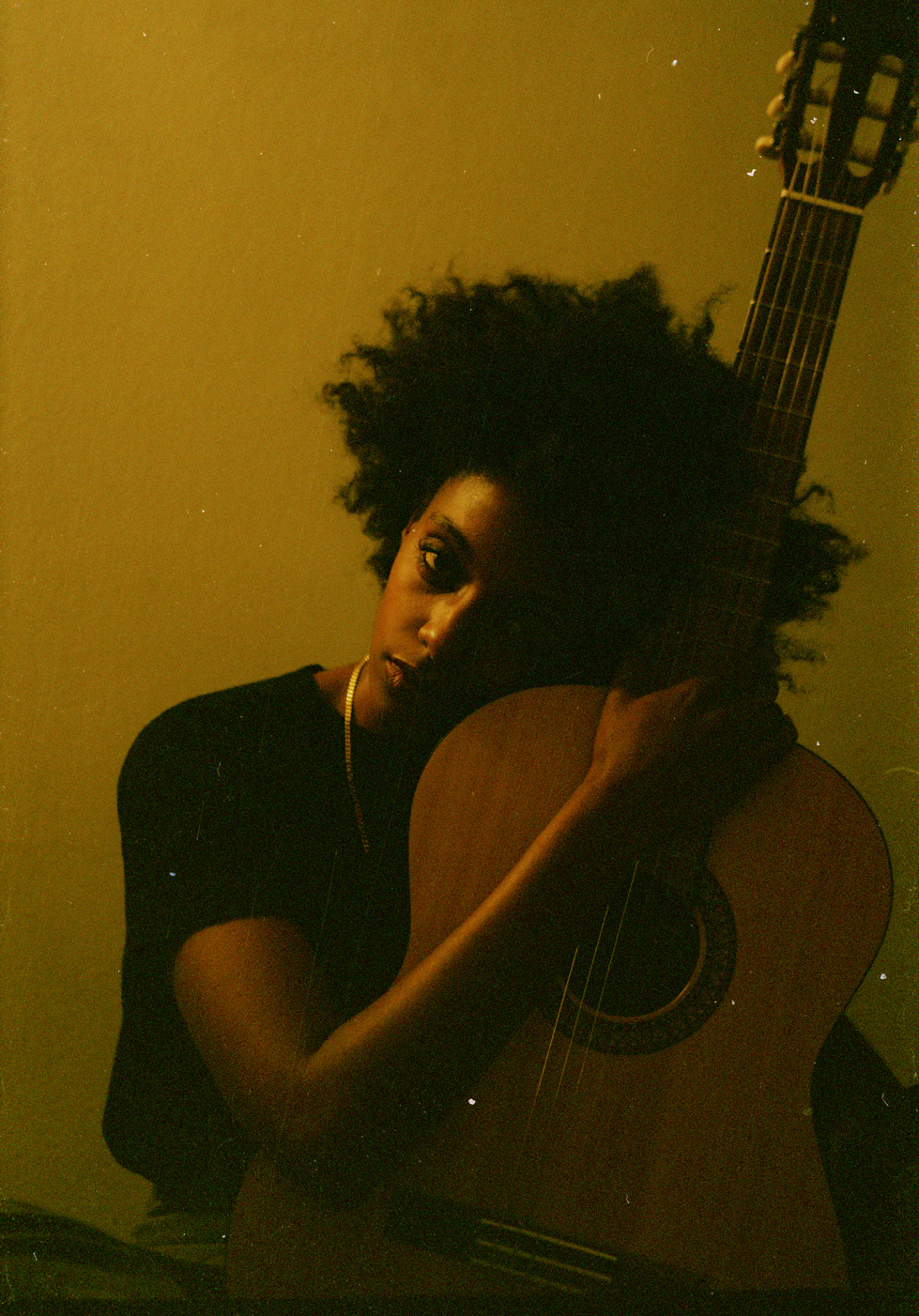
‘Bet my bottom dollar that,
You would make my father go,
Mad like seeing double,
He’d say your name and then call you trouble.’

As a late bloomer (raised christian, struck with the gravity of death at anearly age) my ideology and ways of seeing the world were shifting rapidly at the time and ‘Bet’ was exactly what I needed to spur that shift forward.
It was validation that, there was a world beyond what I’d been conditioned to believe and there were Black people actively living and creating in that world. “[Bet is] Mereba’s tribute to black men. An exploration of self-acceptance and homosexuality in the Caribbean community” is how Nowness described the video but mere words on a screen weren’t enough to detail the feelings it gave me. Fantasy mixed seamlessly into the reality of Mereba’s poetic dissertation on love. The mixture of melody, her soulful voice and poetic lyricism (not the kind of poetry that makes you feel cringe, the kind that grips your soul and makes you reconsider what it means to exist) sparked my curiosity, I needed to know more about Mereba, I needed to know if she had more music that could make me feel this way.
Lucky for me I didn’t have to search far, the video for ‘Bet’ ended with a snippet of ‘Late Bloomer’ (wink), which made me feel the same rush as Bet- if not a more intense one. I realized in that hour of replaying the video that Mereba was truly special.
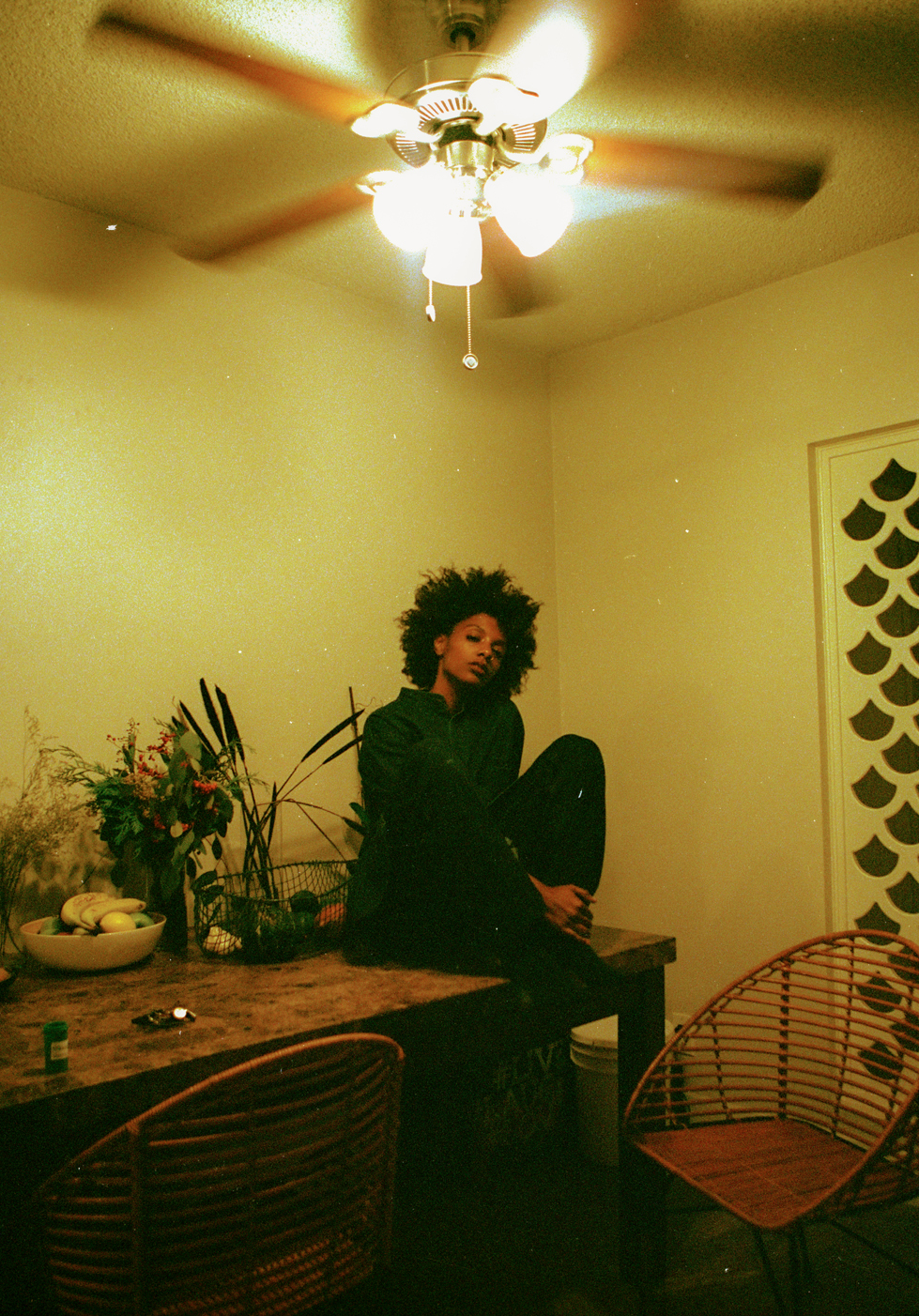

I DM’d Mereba on instagram expressing admiration for Bet/Late Bloomer and gauging her interest in potentially participating in a personal project I was working on (Cascade). Obviously she accepted- so a few months later with a grant secured, I found my way to LA and spent a few hours hanging out and taking photos in her apartment.
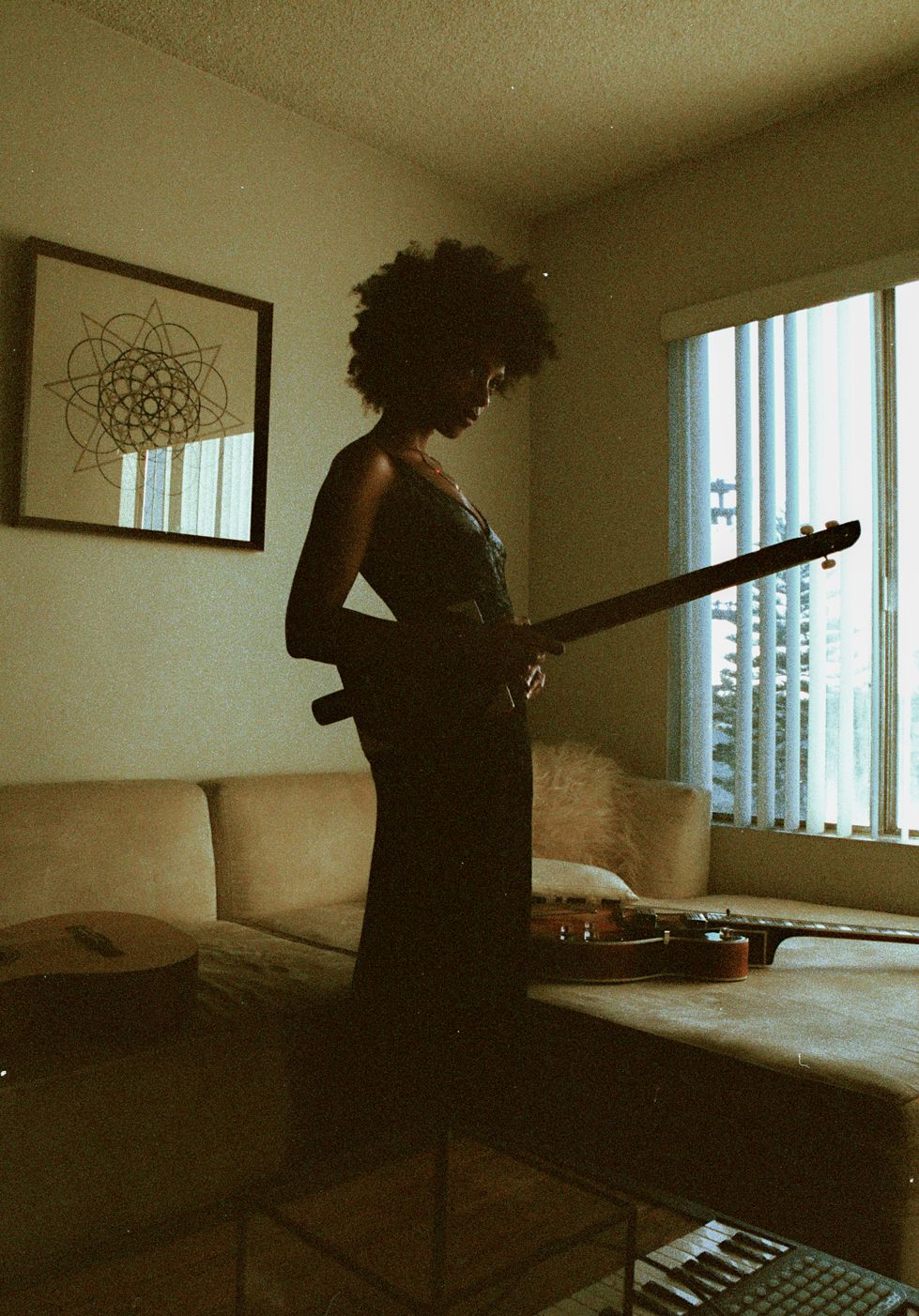



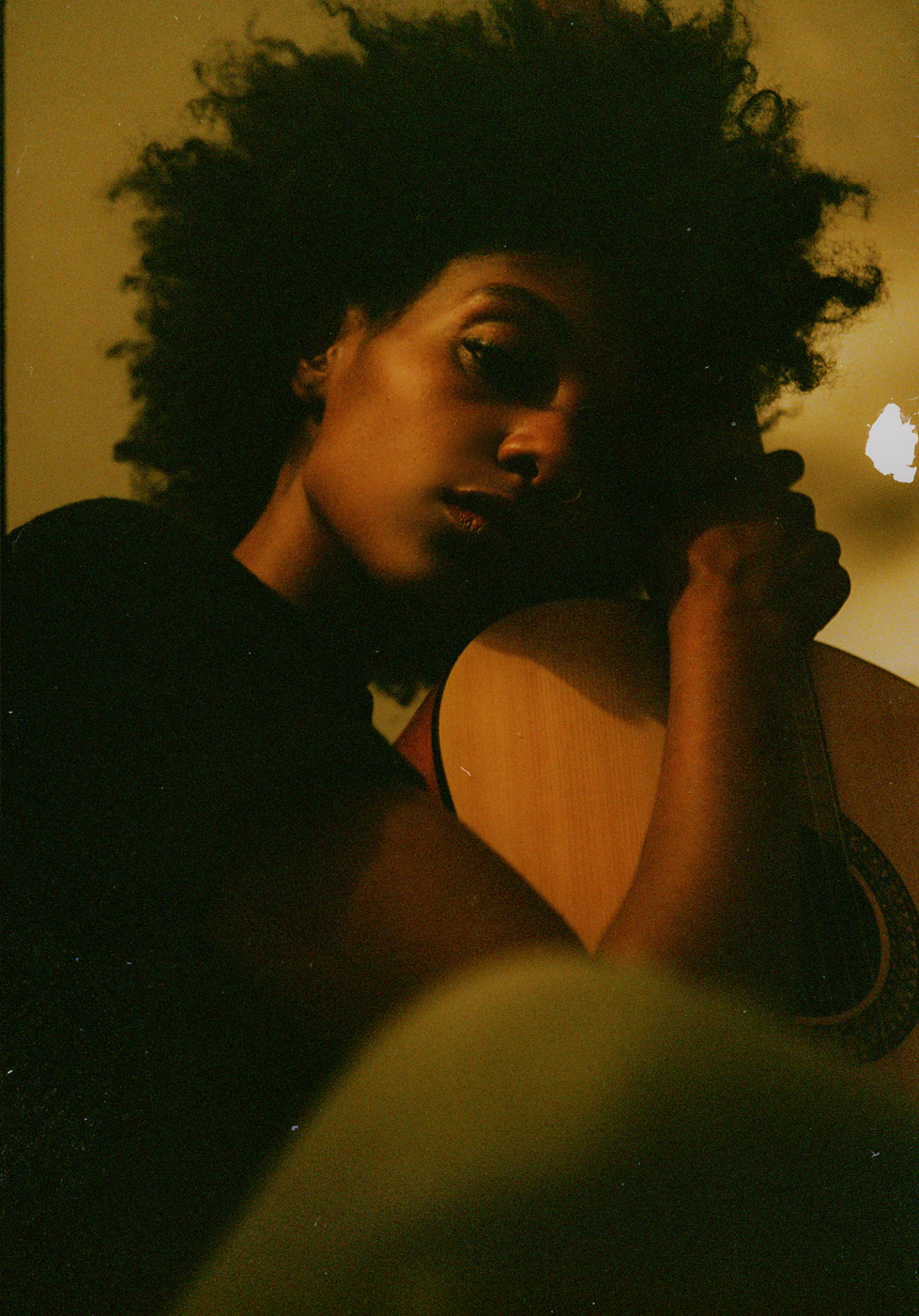

As she went to gather outfit choices for the shoot, she played me the full version of Late Bloomer (only the snippet from the video existed at the time) and I couldn’t help but feel like I was in the presence of something powerful. I remember sitting there with a glass of water in my hand, wishing there was a way to bottle what I was feeling so I could go back and relive it again when I needed to remember what joy felt like.
The pure innocent joy of feeling something for the first time, as age dims the glimmer of excitement and ‘first times’ become far and few, I wanted nothing more than to know that day twice.
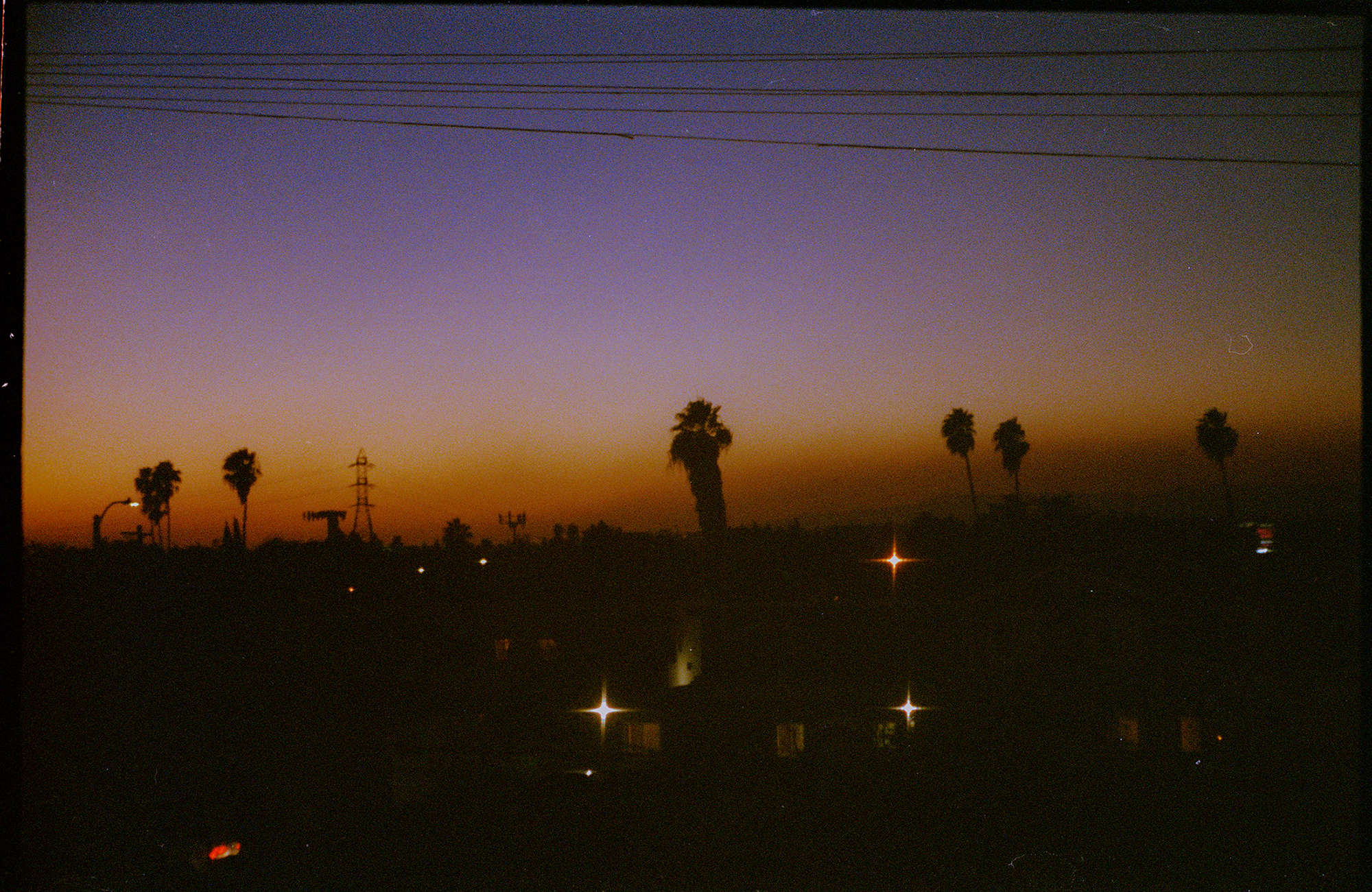
Sunset from Mereba’s apartment.
As I write this years later, with the ‘Bet’ video playing on loop, not a single feeling I had back then has changed. With an album, EP’s, countless features, tours and all the acclaim I knew she’d gain under her belt, there’s no mistaking that Mereba is everything I imagined she would be.

Ojerime wears glasses by Rick Owens, Jacket by Craig Green
Othello : What was the first thing you discovered that caused you to seek out being a musician?
Ojerime : I learned I could play CDs in the car rides with my dad, it would just be us two running errands or I’d have a keyboard lesson then we’d get food. As I grew up, it became my role to control the music in car- eventually I knew the songs off [the top of my] head and I would try and sing all the afflictions in the artist’s voices. After years of singing around the house, my mum asked if I wanted to explore singing [instead of] my talents in performing arts & dance. I didn’t really go for it until I started receiving encouragement from those around me, I made my first YouTube cover to Jazmine Sullivan - Need U Bad and it grew from there.
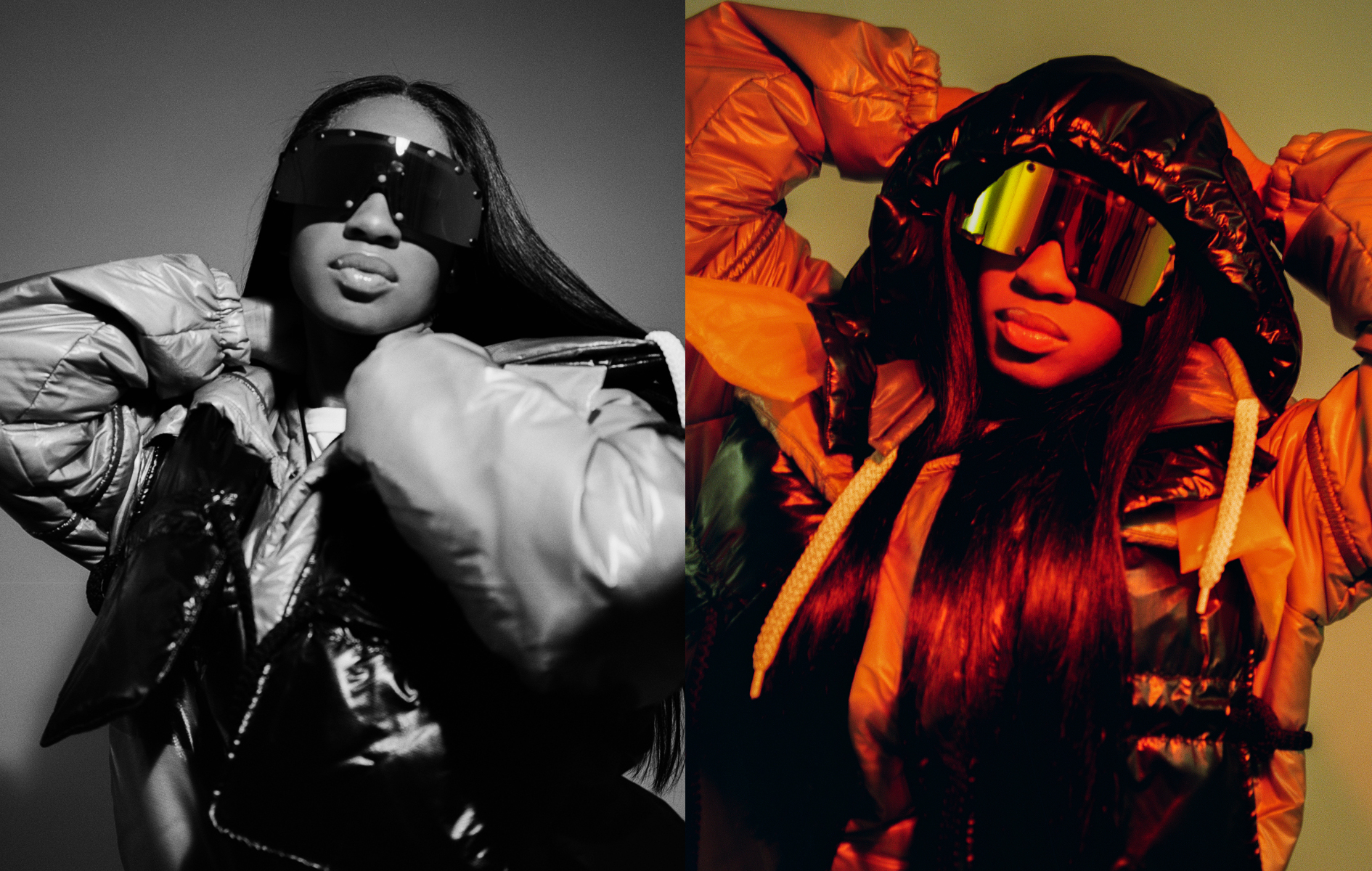
Michael Nyarkoh :B4 Breakdown was such a magnet of feelings on a record. How much of those feelings have held on when making new music?
Ojerime : It’s helped me become looser with my recording process. BIBD is a very raw record and a reflection of how I can create demos with limited resources. On the contrary, I am a perfectionist, so I’ve adopted those new methods to be as free with my writing as possible, then I’ll refine over time and be slower and more patient with the process. I’ve always written my own music, so I spend hours listening back to my old records to hear what needs improvement, so it’s [those errors aren’t] included in future records. I only want to give my best.
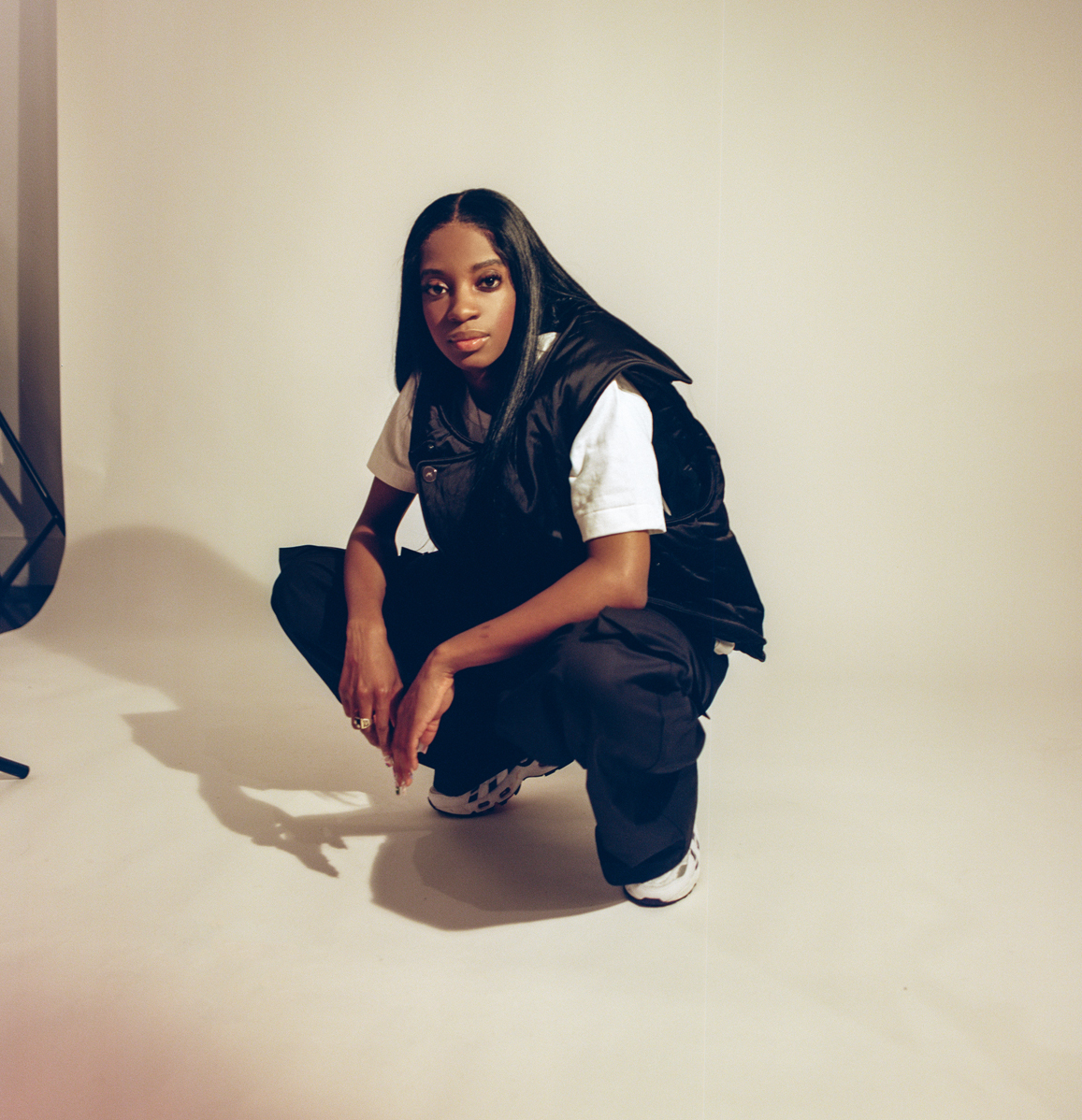
Vest by A-COLD-WALL*, Pants by Jil Sander
MN : Knowing the weight of your work, do you feel obligated to make for yourself as the final receiver or for your listeners?
O : It’s so personal, like a journal. I realise now how impactful my lyrics have been to people’s lives. It’s beautiful that my audience is so expressive in letting me know how it touches them.
OG : Your sound feels both nostalgic and new - what advice would you give to musicians trying to shape their sound?
O : Spend time getting it right for you. This can be done by diverting from trends and focusing on what’s in your heart. Slow growth is still growth, its taken me 10 years to get to where I am and I’m still learning.
OG : What is the experience like navigating the predominantly male music industry as a Black woman?
O : I was a baby when I started, early in time, I felt I’d been unscathed by men until I grew older. I became aware that I wasn’t being taken seriously when it came to my vision. Budgets, respect & a lot of other things looked a little different. Male peers often project their jealousy onto women within the industry in the most obscure ways. I’d say it takes a lot of ‘successful’ moments to receive respect but that can also have the opposite effect so you can’t really win. I’ve avoided that energy and never looked back lol.
OG : Do you find patriarchal systems in place that affect your ability to either produce the music you truly desire / affect the opportunities you’re given?
O : I create what I want sonically but there are a lot of changes at play that have meant the arts go underfunded, there are less spaces/incentives to support Black women in music or focus on artist development- like studio spaces, residencies or communities. We hear about artist development now through DIY bedroom projects (which I really love- sign of the times). Despite my image being personal to me, as women we are digested through the male gaze. There’s still a lot of work to undo here & there’s a lot to unpack when it comes to Black women specifically but examples include the hairstyles, skin shade, features, styling choices, how little or how much we speak, even down to how we react in stressful situations, there will be a microscope on us in those moments. These all [collectively] affect your opportunities. As fortunate as I am to be an independent artist, I still jump through patriarchal hoops to appease the higher ups, to prove I’m worth the investment & at certain points in my career I still wait double the time to get mine.
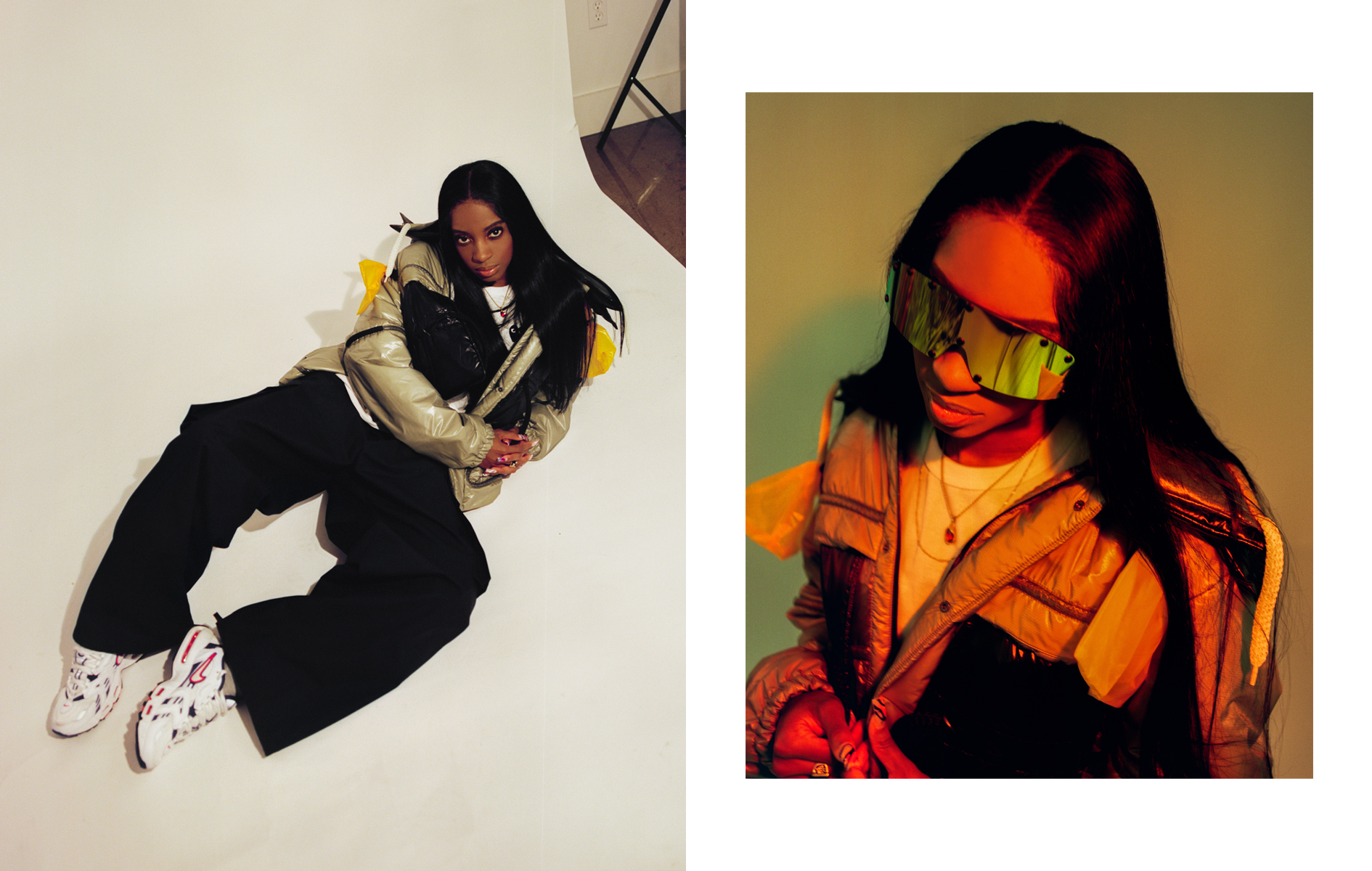
OG : Are there any key moments you can reference that defined the scope of how you create your music now?
O : In 2018-2020 I went through a lot personally which made me a stronger and even more emotionally intelligent person. Great ingredients to apply to my art visually and sonically, I’ve painted a lot of ugly pictures (lessons learned) to make way for the beautiful ones (lessons applied).
OG : What are your thoughts on the idea of perfection in regards to your music, do you often get caught up trying to attain the ‘perfect word/melody/beat’? How did you navigate that on your previous projects vs going into your next project?
O : Sadly I’m a perfectionist. I’ve been working on the [source] of this but its definitely shaped how meticulous I’ve been towards my art. BIBD is my statement against perfectionism and I learned througout that with future art I make, the ‘perfection’ [aspect] can be [adjusted] in creative ways. For the new project Bad Influence I wanted to showcase vocals, beat selection & strong visuals so I really focused on those three. But the imperfections left were my lyrics, as they’re honest & packed with emotions I probably didn’t compute at the time.
